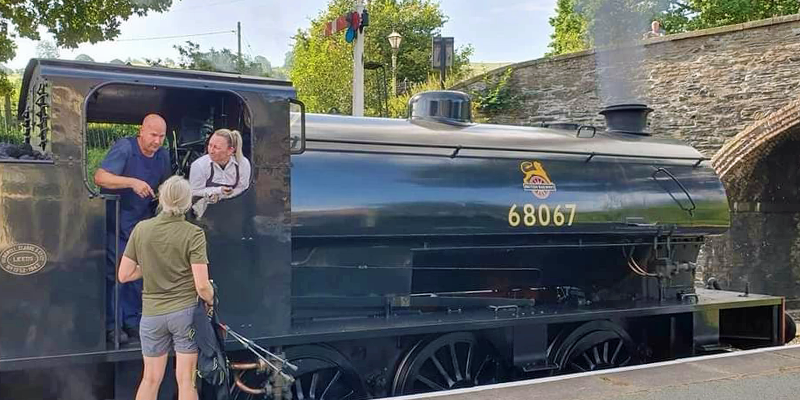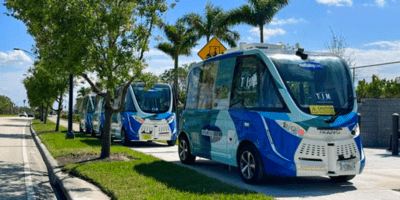Joanne Crompton studied computer sciences at the University of Central Lancashire and graduated in 2004, before moving on to work in finance roles. She is a proud volunteer for the Llangollen & Corwen Railway and discovered her love of steam locomotives following a chance encounter with a steam engine at Leyland railway station whilst she was commuting to work in nearby Preston. As her volunteering developed, Joanne decided to set up her own bookkeeping practice to enable her to balance her professional career with her passion for volunteering on heritage railways and as a result she has now built a niche specialism in finance and governance for projects in the heritage sector.

“I can envisage many more female volunteers coming into both the mainline and heritage railways, not just where you would traditionally see them, like the buffet or the booking office, but into operational roles too. There are female guards, signallers and train operating crew coming through as new recruits.”
From tech graduate to finance specialist
I spent my teenage years in the care system so, sadly, education wasn’t a high priority for me, and the GCSE grades I attained when I left school weren’t brilliant, so at 21, I decided to study at night school, and I then went on to study for a degree in computer sciences, eventually graduating in 2004.
After this, I took on various paid roles within businesses, and eventually, I ended up in the finance department. I realised that the finance departments needed advancement and improvement through better systems and design. These were times of early automation so there was scope for me to use my skills. I had no formal training in finance as such but qualified in systems and design, I developed my skills and integrated the two skillsets, and I learned on the job as I went along.
Unfortunately, in 2019 I received a cancer diagnosis. I was diagnosed with a very rare, aggressive type of cancer, a sarcoma, and the oncologists weren’t sure whether it was terminal at that point. That helped to give me the push to formally train as a bookkeeper to fill in the gaps in my finance knowledge.
I began by taking an Institute of Certified Bookkeepers (ICB) training course while I was recovering from cancer surgery. I passed my Level 2 in bookkeeping in 2019, and I then went on and passed Level 3 in bookkeeping and accounts in 2020, and then Level 4 in advanced bookkeeping and accounts in 2021. I was in employment at the time, but by mid-2021 I decided to take the leap to leave employment and start my own practice.
The main driver for this was that I wanted to experience running my own business and work more closely with clients, but also by this point, I was a very active volunteer on steam engines on heritage railways (more on that in a moment!) and I needed the flexibility that setting up my own practice and having my own clients gave me.
Falling in love with steam
I have spent most of my adult life being a parent. I had my son when I was 18 and then went on to help raise three other children with my husband. These were great times, and I loved every minute but there came a stage in my life when the children grew up and moved out and I was suffering from empty nest syndrome and was looking for something to do.
I had always had a quiet passion for all things steam-related, but I’ll never forget the day that I really fell in love with steam engines. It was the 20th of September 2011. I was 34 and I was commuting to work. I was waiting at Leyland station on my way to Preston. It was a lovely sunny, autumnal morning and suddenly, this beautiful steam train pulled into the station, and it was love at first sight.
I’d never seen a full-sized steam engine. My granddad had been a model engineer, building small steam engines like the ones you see at parks, pulling children around. Sadly, he’d passed away when I was 13 so I’d never looked at them again, but then, suddenly, out of nowhere, this huge steam engine pulled into the station, pulling a charter. (Charters are leisure services that can be hauled by either historic steam or diesel locomotives.)
I boarded my train to Preston, and as it turned out, the steam train was going to Preston as well. When my train pulled in and I alighted, the steam train had arrived too, stopping for water, so I stood and watched the fireman put coal on. At that point, I was mesmerised, and I thought: “I have to learn how to do that,” so I joined a heritage railway in 2012.
In 2014, I started fireman training, and within 15 months I’d made the grade of what is called ‘passed cleaner’, this meant I could fire steam locomotives. I was the first woman ever at that heritage railway to reach the grade, in a very short time frame too! It was an amazing achievement that I worked very hard for, and that I am very proud of.
Becoming a ‘passed cleaner’ is similar to when you pass your driving test, and you get a P plate for two years. You can take on the role of fireman but under a probationary period. The next grade after ‘passed cleaner’ is ‘fireman’, so when you have completed your probation period, you are upgraded to ‘fireman’.
Using the term ‘fireman’ has opened up a lot of debate. For the mainline railway industry, a lot of historic roles have been amended to modern-day equivalents, such as ‘signalman’ becoming ‘signaller’ but I prefer to be called a ‘fireman’ because, in my view, we are trying to recreate a heritage role in a living theatre setting.
I always explain that the term ‘fireman’ can mean different things to different people. It could be ‘fireman’ as in gender, as in a ‘fire man’, or a shortened form of ‘fire manager’, because ultimately that’s what you are doing, you’re managing the fire, there’s different ways to interpret it.
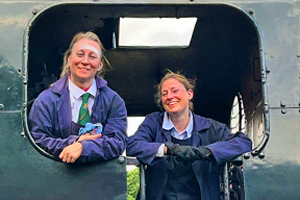
I’ve spoken to quite a few women over the years who fire steam engines and all of them prefer to be known as ‘fireman’.
I made ‘fireman’ grade in 2017 and whilst looking for a new challenge, I joined the Llangollen & Corwen Railway in 2018, making the grade of ‘passed cleaner’ there in August 2019, just six months after my cancer treatment, going on to make the grade of ‘fireman’ in 2020.
The Llangollen & Corwen Railway is a beautiful line set in the Dee Valley in North Wales. It’s mainly a tourist railway showcasing the valley. Llangollen is a gorgeous town which attracts a lot of tourists, many coming from cruise ships and things like that. The railway is very much part of the town. The railway has recently just opened a brand-new station at Corwen, which has been in development for the last 15 years or so, all built by volunteers who were an average age of 60 plus. A phenomenal achievement.
Throughout COVID the line struggled and went into administration. It was only through the sheer determination of volunteers that the railway was saved, but now it’s really thriving. It’s got a great atmosphere — a family-orientated volunteering experience. Even though you’re not related to anybody, in my experience it’s very much a family, and an inclusive and supportive family at that.
I can envisage many more female volunteers coming into both the mainline and heritage railways, not just where you would traditionally see them, like the buffet or the booking office, but into operational roles too. There are female guards, signallers and train operating crew coming through as new recruits. The Llangollen & Corwen Railway is starting to grow now too, a real phoenix from the ashes and I am very proud to be part of that.
Combining running my own business with volunteering
It is so much easier fitting in my volunteering now I’m self-employed because with the best will in the world, you can try to plan your volunteering days, but sometimes volunteering days just can’t be planned. Sometimes you may get a call because there is a last-minute vacancy for a fireman or a last-minute project that needs people to help. Working for myself gives me that flexibility to time manage so I can say: “I can be there tomorrow.” Running my own business means I have that flexibility and that forward planning to think: “Right, can I do that?”
Being a fireman can be difficult, and it’s a unique heritage skill, so, as you can imagine, the number of qualified volunteers who can perform that role is small, so if someone is unavailable at the last minute there isn’t a large pool of people to call on. Most volunteers are either retired or working in an employed role, but becoming self-employed has made a huge difference and gives me that flexibility to plan my volunteering career and help out in times of need.
Being diagnosed with cancer was a big leveller too. It was literally two days after my 42nd birthday and the consultant called me in and said: “We think you’ve got a really rare cancer and we can’t tell you if we’re talking about a recovery or an amount of time’. We need to operate on you within the next two weeks.” When you have a diagnosis like that out of the blue of an extremely rare cancer with a low survival rate, it makes you think and reevaluate your life.
At that point, I was in employment in a reasonably good job in an accounting practice but it made me realise I wanted to be self-employed so I could work more closely with a smaller number of clients. When you work in practice you have hundreds of clients and speak to them once a year, and that’s the end of it, whereas I wanted to work with a handful of clients so I could assist them, helping them grow, which I suppose links back to my desire to help people as a volunteer.
I’m all for empowerment, enrichment, and development. The cancer could come back at any time, so I’ve done a lot of thinking and living since 2019.
Preserving our steam heritage
There are so many challenges for heritage railways now, lack of heritage skills being one and the main, more visible one, coal. The UK must now import coal and that comes at a lot more environmental risk and cost. Coal is mined in other countries, countries that might have less regard for the environment. The coal is then shipped halfway across the world, which causes more pollution. There’s now an even greater responsibility for people who burn coal to know how to burn it properly.
In my opinion, coal has been demonised somewhat. When I am teaching trainees, one of the most important parts of my job as a fireman is to teach them how to burn coal responsibly. It’s about getting the best out of it with less impact on the environment.
The Heritage Railway Association (HRA) is lobbying the government to reconsider the current situation regarding UK mining, as importing coal is just not a satisfactory long-term solution. Demand for coal is extremely high as it only comes into the country at certain times.
The green issue has become very skewed in my view. Since the final UK mining licences expired in the run-up to Net Zero, we’re being forced to import coal from other countries, and sometimes it’s not good quality coal, so when it burns it produces more toxic volatiles than most coal that used to be mined in the UK. Burning it responsibly means making sure it is giving off as little smoke and as few volatiles as possible, substandard coal can make this very difficult.
Sourcing coal has caused a lot of competition and it’s a huge cost to heritage railways. A couple of years ago coal was around £150-£170 per ton. Today it’s at £400+ per ton and it isn’t always good enough for what we need it for.
There are a few UK companies that have been looking at producing different types of coal, which is more environmentally friendly, but it has had limited success in certain situations.
There will always be a need for coal on heritage railways so, from my point of view, it would be better to have a controlled, good-quality UK source, perhaps with licenses only granted for those who can prove they can burn it responsibly.
As the older volunteers retire, there are gaps developing in the heritage skills needed to keep heritage stock going, youngsters need to be encouraged to get involved, so those heritage skills can be passed on and be developed. When I see children visiting the railway a lot of them have never seen a steam engine, or fire, or coal and I try to explain to them what we are doing — using the basic elements of air (oxygen) and fire to generate heat to heat the water, that produces steam, that drives these machines.
Steam engines are a rich part of our heritage, and we need to preserve them.
Support from the Womanthology community
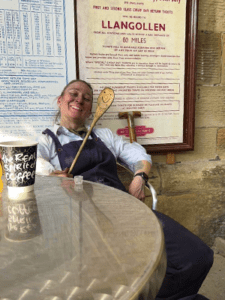
I’d also like people to see from this article that there are roles everywhere for women, you’ve just got to look for them, seek them out. The more we can show women in these roles, whatever that role is, we can see that women are taking control and promoting themselves. We see organisations like Network Rail and train operating companies looking to recruit women and young people, we can do that in the heritage space as well.
Come to the railway and you can develop by learning old ways of working, which will complement the new, modern ways of working. Develop the much-needed skills to help us preserve our fantastic heritage railways for everybody.
Discover the wonder of steam for yourself
The best way to find out more is to follow the links at the bottom of this article. Google ‘heritage railways’ in your local area and visit them too.
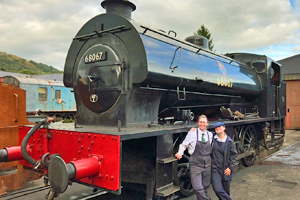
Why not be part of that change? The more women that are visible the more it shows a culture that is positive and inclusive.
If you decide you’d like to get involved, contact the volunteer liaison officer for that railway. Go on a tour and express an interest. The only way is to try it. Most areas of the heritage rail industry are improving where EDI [equity/equality, diversity, and inclusion] is concerned. Heritage railways are working towards becoming open and available for everyone.
On my last turn at Llangollen & Corwen Railway, we almost had a full complement of women operating the train. We had a female guard. I was the fireman, and we had a female trainee. If we just had that elusive female driver, we could have run an all-female service that day, which makes me proud, real progress is happening.
Finding a new niche
What’s coming up next for me? On the volunteering side, I’ve just become a fireman trainer and I’ve written a new set of training material for the new trainees, and I’m now physically training new trainees in locomotive firing and skills. I love passing on my skillsets because people passed those on to me so it’s my responsibility and duty to pass it on to the next generation.
We’ve got younger people joining up now too, so I want to mentor and nurture them as well as other women. It’s not just about learning to manage the fire, it’s social skills, interaction skills and confidence building. It’s setting people up for life. I learned so much from volunteering, so I think that’s the next step in my career.
On the business side, I would like to grow my practice. I’m developing a bit of a niche area, I am working with quite a few heritage railways, mainly the member societies and trusts. With my knowledge of the industry, the groups are approaching me for advice. These groups were started back in the last days of steam, an informal group of like-minded enthusiasts who clubbed together to buy steam engines from the scrap man.
Now, 30 to 40 years down the line they have now become formalised as charities and are bidding for grant funding to restore locomotives, this brings along the need for strong financial governance. As I’m in the industry, I understand it, I understand what these groups do and I understand all the unique things that can occur. I’m qualified in finance and preparing charity accounts, so these member groups are coming to me for assistance and that’s helping me develop a niche in my practice. This means I’m getting the best of both worlds, doing something that I love at the same time as helping all these railways become more financially sound and secure for the future. What could be better?

